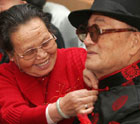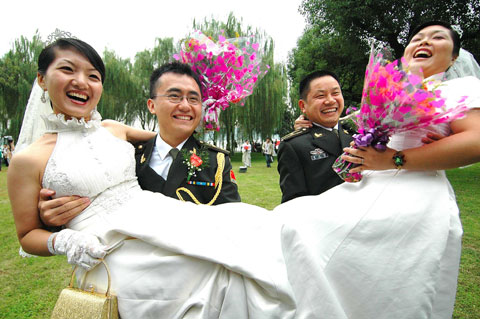Hu Jintao's commitment on Monday to "increase transfer payments, intensify the regulation of incomes through taxation, break business monopolies, create equal opportunities and overhaul income distribution practices with a view to gradually reversing the growing income disparity" was like music to the ears. This departure from the West's growing faith in Adam Smith's invisible hand to serve all people best, when in fact unbridled the market tries to commodify them, is the best path for the world's most populous country. In the past 30 years, a less compassionate neoliberal orthodoxy has prevailed among economists after the social justice traditions of the United States' New Deal and Great Society governments were scuttled by President Ronald Reagan's low-taxing, deregulation-privatization formula in the wake of the post-war golden age.
 Ben Johnson
Ben Johnson |
After great social upheaval in the 1960s, America arguably shirked the provision of comprehensive state-funded social programs needed to improve the plight of its poor – especially the country's newly enfranchised and once enslaved African-Americans. By portraying the poor as welfare leaches, conservatives hoodwinked the have-nots into voting for low taxing, small-government Republicans on the promise that the "crumbs" of prosperity would fall off the table for all to enjoy. Almost 30 years later American CEOs earn about 431 times more than their employees and the top 10 percent of income earners own 70 percent of the wealth.
Chinese CEOS earn only a fraction of what their American counterparts do, and 10 per cent of families own 40 per cent of the wealth. But worryingly China's Gini coefficient, a widely accepted statistical income gap measure, is roughly the same as America's after increasing markedly in the past 25 years. But the growing divide between the haves and have-nots in the West is made even more egregious by the fact company bosses, beholden to shareholder interests like dogs to chains, are lauded and rewarded for affecting workforce efficiencies – lay offs, outsourcing, denying employee benefits etc – while contributing to untold social disharmonies no more manifest than in the dissolution of the nuclear family. American car maker General Motors, for example, laid off 34,000 workers in one fell swoop last year, and now about 120 million Chinese workers employed in private enterprise, which grows by 11 million each year, are exposed to the same profit-first orthodoxy.
In a salutary lesson for developing economies, a backlash to the excesses of pro-market policies championed by Reagan and acolytes like Australia's John Howard is now gaining momentum. The Democrat's success at last year's congressional elections in part reflects growing concerns over inequality while the US military-industrial complex's chimerical hand in a massacre of Iraqis by a privatized army could well be the nail in the right's coffin. Long-serving Prime Minister Howard, who has championed workforce deregulation, is also facing electoral oblivion after giving small employers unprecedented powers and pulling the state out of education to widen the wealth gap among Australians.
Income disparity irks people more than ever in the 21st century because advanced communication mediums allow us to see how the other half lives. Tellingly, a study by Cornell University economist Robert Frank found most people would prefer to be paid substantially less just as long as they were earning more than others. China is taking action to ease tax burdens on the rural poor and the dibao social assistance system. As Hu's report touched on this week, policies promoting greater income distribution, welfare and access to education are vital to Chinese socialism in the years ahead. After all, the principles of supply and demand will only slowly alleviate poverty and make the futures of private sector employees as tenuous as they will be prosperous.
The author worked as a general news reporter for four years on Australia's biggest selling newspaper, The Sunday Telegraph, during which time he studied a Masters in International Relations at the University of Sydney.












